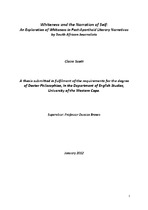| dc.description.abstract | Drawing on broader discussions that attempt to envision new ways of negotiating identity, nationalism and race in a post-colonial, post-apartheid South Africa, this thesis examines how whiteness is constructed and negotiated within the framework of literary-journalistic narratives. It is significant that so many established journalists have chosen a literary format, in which they use the structure, conventions, form and style of the novel, while clearly foregrounding their journalistic priorities, to re-imagine possibilities for narratives of identity and belonging for white South Africans. I argue that by working at the interstice of literature and journalism, writers are able to open new rhetorical spaces in which white South African identity can be interrogated. This thesis examines the literary narratives of Rian Malan (My Traitor’s Heart, 1991), Antjie Krog (Country of My Skull, 1998, and Begging to be Black, 2009), Kevin Bloom (Ways of Staying, 2009) and Jonny Steinberg (Midlands, 2002). These writers all seem to grapple with the recurring themes of 'history', 'narrative', 'dentity' and in exploring the narratives of their personal and national history, they attempt to make sense of their current situation. The texts that this thesis examines exhibit an acute awareness of the necessity of bringing whiteness into conversation with 'other' identities, and thus I explore both the ways in which that is attempted and the degree to which the texts succeed, in their respective projects. I also examine what literary genres offer these journalists in their engagement with issues of whiteness and white identity that conventional forms of journalism do not. These writers are challenging the conventions of genre - both literary and journalistic - during a period of social and political flux, and I argue that in attempting to limn new narrative forms, they are in fact outlining new possibilities for white identities and ways of belonging and speaking. However, a close reading of these literary-journalistic narratives reveals whiteness in post-apartheid South African to be a multifaceted and often contradictory construct and position. Despite the lingering privilege and structural advantage associated with whiteness, South African whiteness appears strongly characterised by a deep-seated anxiety that stems from a perpetual sense of ‘un-belonging’. However, while white skin remains a significant marker of identity, there does appear to be the possibility of moving beyond whiteness into positions of hybridity which offer interesting potential for ‘becoming-other’ | en_US |

